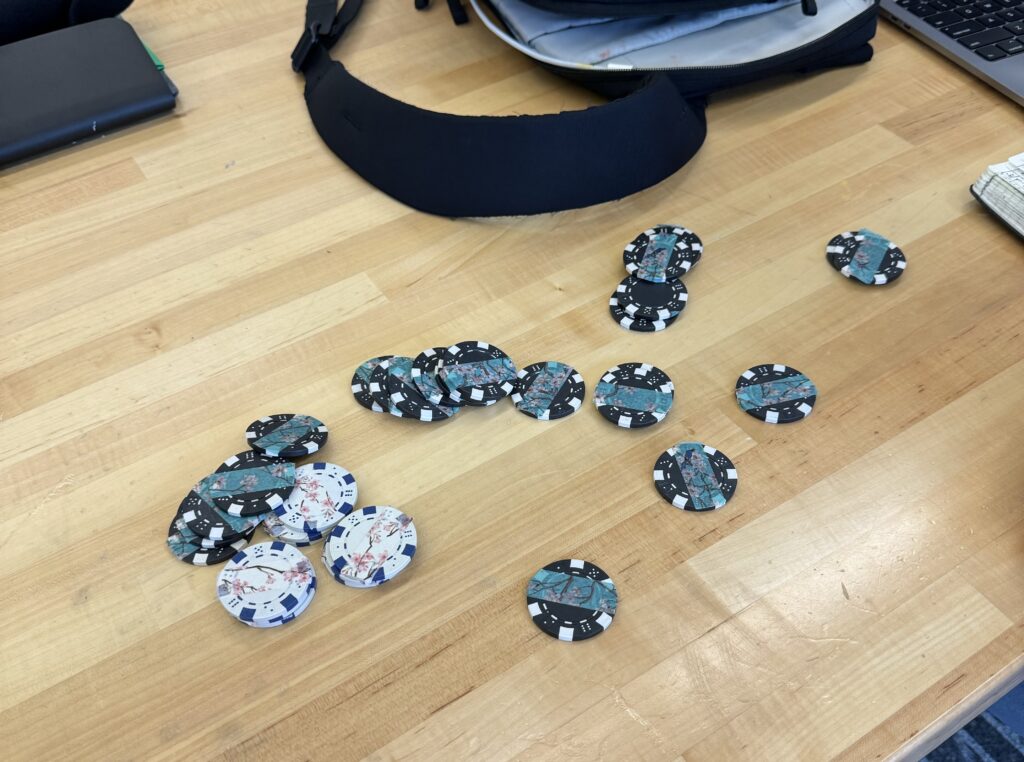We began our first meeting by discussing whether we wanted to create a board game or a card game. With board games, we would have more creative freedom; however, at the same time, it was more difficult to narrow down a specific concept and game mechanics. We were more drawn to card games, as we’d both had memorable experiences playing card games. We talked about card games we had played and enjoyed such as ERS and Hanabi. We decided to take the weekend to think independently about game ideas so that we could flesh out our vision before meeting again. In our next meeting, we planned to share our ideas and give feedback, combine ideas, and rework games to create one we were happy with.
During the weekend, we created possible games by working off of mechanics and ideas we liked. For example, both of us created games using the idea of being able to see every hand except yours, which is used in Hanabi. We also brainstormed games where the players worked collaboratively as well as games involving betting.
By our second meeting, we had come up with a few game ideas we had liked. Riya shared her game, in which everyone had a hand turned away from them and you had to swap other people’s cards in order to make your “goal hand”. Rachel shared a game where you bought and sold cards with the goal of hitting a sum as well as a collaborative game in which you had to work together to hit a common sum. In our discussion, we shared that we liked the simplicity of rules in Riya’s game since the rules were easy to pick up. We also liked the betting aspect of Rachel’s game; however, we decided that it made the game too time-consuming. We both liked the idea of hitting a sum as well as the idea of having a shared goal. In our next iteration, we decided to use Riya’s game, where instead of hitting a goal hand, you had to hit a goal sum. The goal sum would be the same for everyone in the game. Before breaking, we decided to call our game “SomeSum”, which is a play on the goal of the game to hit a sum. Some of our open questions were whether a shared total would be better than having individual goal totals, how long each round should be, and what good possible goal totals would be.
In our third and final meeting, we had finished a rough outline of the rules of Some Sum and were ready to start playtesting the game. At this point, the game involved swapping, adding, and discarding cards to hit a goal sum. In our first round, we played with three cards each. However, we quickly noticed that the game involved too much mental math, as you would have to recompute everyone’s hand with each play. Further, it was too easy to figure out all the cards in play, since we allowed you to trade cards in your own hand. We decided to move forward by restricting our deck to numbers one through five. We also decided to change the objective of the game to hitting individual totals for comparison. In this iteration, we still found that the game had too much mental math. The goal totals were also too high for the cards in the deck, and as a result they were too difficult to hit. After a bit of discussion, we decided to change the objective of the game to hit zero, with black numbers being positive and red numbers being negative, as it was easier to cancel out opposite numbers than it was to sum all the numbers together. Further, we decided to model our game after Go Fish by giving out points whenever someone hit a zero hand. After playing a few rounds with these new rules, we found that the game had hit a sweet spot of being fast-paced, strategic, and fun. We decided to add more interest to the game by adding additional special mechanics that allowed players to make other players swap hands as well as block plays. Further, we decided to use a point chip system in which you would need a certain number of chips to win, but at some point you would need to steal chips from players to gain an advantage. We also decided to use chips to keep track of how many “special moves” each player was allowed.

